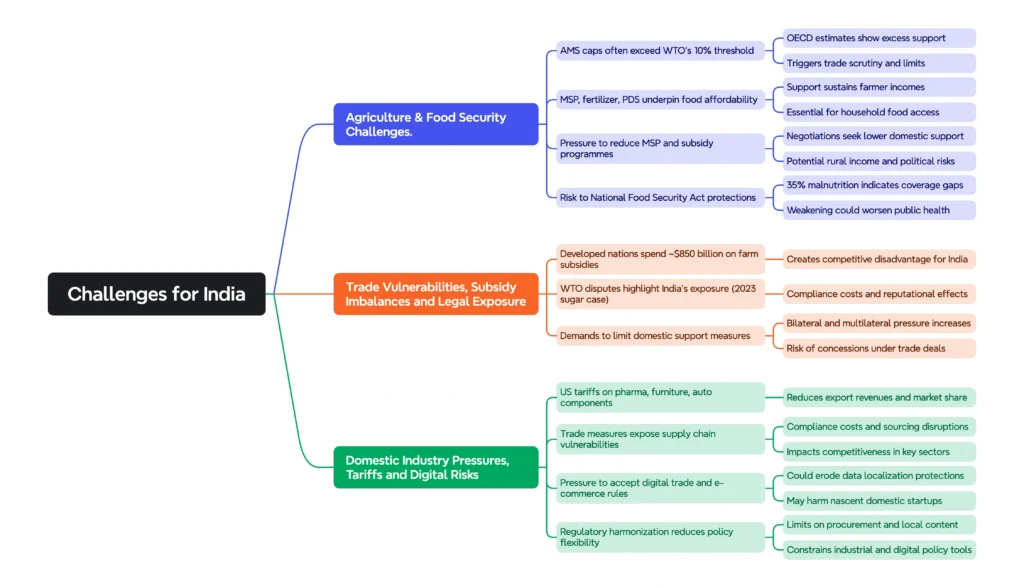Paper: GS – II, Subject: International Relations, Topic: Global issues, Issue: Significance of SDT for India.
Context:
At a UNGA event, China announced it will no longer seek Special and Differential Treatment (SDT) at the WTO. For India, this move intensifies scrutiny as it continues to rely on SDT provisions.
Key Highlights:
What is Special and Differential Treatment (SDT)?
- A WTO principle since GATT 1995, it provides developing countries:
- Subsidy flexibility.
- Safeguards for vulnerable farmers.
- Leeway in protecting infant industries.
- Flexibilities: SDT allows developing countries flexibilities such as:
- Longer transition periods.
- Higher subsidy caps.
- Phased implementation of trade rules.
- Significance for India: It is essential for India’s food security, farm subsidies, and industrial support programmes.
China’s Decision and Implications:
- Seen as symbolic retreat under US tariff pressures.
- Allows China to appear cooperative while retaining structural advantages.
- Raises expectations for India to shed its developing country status.
- Intensifies demands from developed nations for India to limit subsidies and open its markets.
Challenges for India:

India’s Options:
At WTO:
- Build coalitions such as G-33, Cairns Group to defend food security concerns.
- Demand equal treatment as developed countries must also reduce hidden subsidies.
- Link concessions with reciprocity on data, climate, and environmental goods.
Domestic Policy Adjustments:
- Subsidy Redesign: Shift to Direct Benefit Transfers (DBT) for food & fertilizer.
- Agri Reforms: Promote crop diversification, investment in food processing, and value chains.
- Industrial Strengthening: Expand PLI schemes to build export competitiveness.
Digital & Services Trade:
- Strengthen ONDC (Open Network for Digital Commerce).
- Push for recognition of India’s IT & services exports dominance (55% of GDP) at WTO.
Balanced Reciprocity:
- Offer tariff-free access selectively in exchange for climate finance, tech transfer, and digital sovereignty safeguards.
Conclusion:
For India, SDT is not a luxury but a necessity to protect farmers, food security, and vulnerable industries. By combining domestic reforms with assertive global diplomacy, India can safeguard its interests while adapting to new trade realities.
https://indianexpress.com/article/opinion/columns/india-needs-a-plan-10273739
La Excellence IAS Academy, the best IAS coaching in Hyderabad, known for delivering quality content and conceptual clarity for UPSC 2025 preparation.
FOLLOW US ON:
◉ YouTube : https://www.youtube.com/@CivilsPrepTeam
◉ Facebook: https://www.facebook.com/LaExcellenceIAS
◉ Instagram: https://www.instagram.com/laexcellenceiasacademy/
GET IN TOUCH:
Contact us at info@laex.in, https://laex.in/contact-us/
or Call us @ +91 9052 29 2929, +91 9052 99 2929, +91 9154 24 2140
OUR BRANCHES:
Head Office: H No: 1-10-225A, Beside AEVA Fertility Center, Ashok Nagar Extension, VV Giri Nagar, Ashok Nagar, Hyderabad, 500020
Madhapur: Flat no: 301, survey no 58-60, Guttala begumpet Madhapur metro pillar: 1524, Rangareddy Hyderabad, Telangana 500081
Bangalore: Plot No: 99, 2nd floor, 80 Feet Road, Beside Poorvika Mobiles, Chandra Layout, Attiguppe, Near Vijaya Nagara, Bengaluru, 560040
